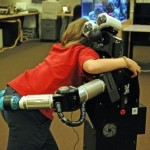 The last few years have seen a tremendous growth in robotics, but it’s probably fair to say that their core growth has been in less personal areas. Where the relationship between robot and human is more personal there has been slightly less progress.
The last few years have seen a tremendous growth in robotics, but it’s probably fair to say that their core growth has been in less personal areas. Where the relationship between robot and human is more personal there has been slightly less progress.
A recent study from academics at the University of Lincoln suggested that robots may need to be made with more human like flaws and foibles in order for them to gain acceptance in our more personal lives.
There are positive signs of progress however, with a recent study highlighting how robot carers have been accepted, and even relied upon by patients on a personal level in elderly care.
Most of these explorations look at the relationship very much from the humans point of view, but a recent study, published in Nature, looks at things from the other end and explores whether humans feel empathy for their robot companions.
Empathising with our robot friends
The research, conducted by a Japanese team, believes it has found the first neurophysiological evidence of our ability to empathize with a robot in apparent pain, albeit at a slightly different level to that shown towards other humans.
The study saw EEG tests performed on a, relatively small, sample of adults who were shown pictures of either a human or robotic hand that was in a painful situation.
The results were fascinating. Participants did show empathy towards the robot, but at a lower level than to the humans in the picture.
“The ascending phase of P3 (350-500 ms after the stimulus presentation) showed a positive shift in the observer for a human in pain in comparison with the no-pain condition, but not for a robot in perceived pain. Then, the difference between empathy toward humans and robots disappeared in the descending phase of P3 (500-650 ms)”, the authors say, “The positive shift of P3 is considered as reflecting the top-down process of empathy. Its beginning phase seems related to the process of perspective taking, as was shown in a previous study.”
In other words, we do tend to empathize with robots in a similar way to humans, but we tend to take a bit longer to warm up to them. The authors suggest this is largely down to the challenges in understanding the perspective of the robot.
The researchers next plan to explore whether robots could be constructed such that it becomes easier to gain this sense of perspective. It will be interesting to monitor how they get on.
It's a fascinating one as you suspect it needs to happen at some point, but it's just a struggle at the moment to imagine any kind of emotional attachment to a robot, although of course people get emotionally attached to things like cars so it's possible.
I don't buy this. Robots don't have emotions – humans have emotions.
There can't be any emotional response because it's a MACHINE!
LOL,why dont u ppl read this article again?It refers about human emotional attachment to robots and you can be attached even to dirt under your nail…this is nothing special. Now considering robots i guess it wont be too much problem to program them with emotions in near future.
Seems that the Lincoln team have tried to do this by naming their care robot Alfie
http://www.lincoln.ac.uk/news/2016/03/1208.asp
I just can't see the point in this I have to say. I mean really.
The bond is strong in this one
http://www.theguardian.com/technology/2016/mar/22…
I'd love to see if they were reviewing the usefulness of such a project. An analysis of the results would be fascinating.